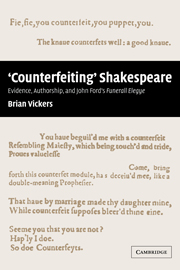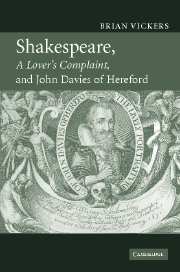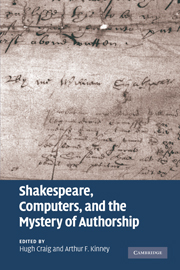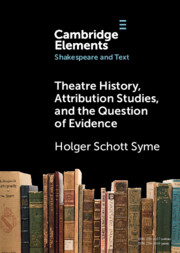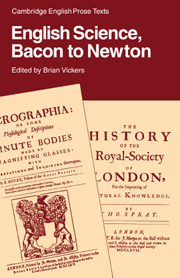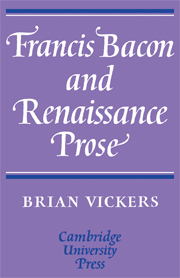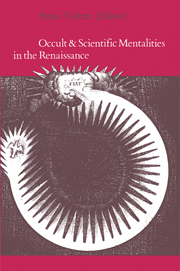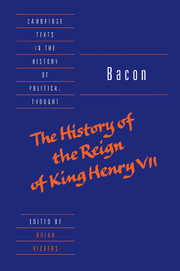'Counterfeiting' Shakespeare
'Counterfeiting' Shakespeare addresses the fundamental issue of what Shakespeare actually wrote, and how this is determined. In recent years his authorship has been claimed for two poems, the lyric 'Shall I die?' and A Funerall Elegye. These attributions have been accepted into certain major editions of Shakespeare's works but Brian Vickers argues that both attributions rest on superficial verbal parallels; both use too small a sample, ignore negative evidence, and violate basic principles in authorship studies. Through a fresh examination of the evidence, Professor Vickers shows that neither poem has the stylistic and imaginative qualities we associate with Shakespeare. In other words, they are 'counterfeits', in the sense of anonymously authored works wrongly presented as Shakespeare's. He argues that the poet and dramatist John Ford wrote the Elegye: its poetical language (vocabulary, syntax, prosody) is indistinguishable from Ford's, and it contains several hundred close parallels with his work. By combining linguistic and statistical analysis this book makes an important contribution to authorship studies.
- Highly contentious field and this is a hard-hitting book
- Rejects the ascription to Shakespeare of two poems which some have accepted into the canon
- Uses linguistic and stylistic methods of analysis
Reviews & endorsements
Review of the hardback: 'The reader of this long book, which largely consists of close stylistic analysis, is swept along by the power of its indignation … this battleship of a book delivers what are likely to be the final salvos of a hard-fought literary engagement.' The Times Literary Supplement
Review of the hardback: 'No one doing attribution work can ignore this book … Vickers has set out a programme and an example for authorship studies …' Jonathan Hope, Literary and Linguistic Computing
Review of the hardback: 'Brian Vickers, a scholar brilliantly suited in intellectual acumen and feisty temperament for such a controversy … [has produced] a very valuable study, and one that justifies its length and attention to technical detail … This book is a tour de force of considerable beauty'. David Bevington, Renaissance Quarterly
Review of the hardback: 'Marshalling a fearsome array of stylometric tables and statistical charts Vickers demonstrates in detail that every one of the linguistic, prosodic and rhetorical features that supposedly stamp the Funerall Elegye as 24-carat Shakespeare prove nothing of the sort … Counterfeiting Shakespeare [is] a major contribution to the arcane domain of attribution studies, which has wider implications for our understanding of Shakespeare's poetry and plays. For, in the course of confuting misattributions … Vickers equips us with the means of identifying more confidently than was previously possible, the unmistakable music of Shakespeare's mind at play in language …' Kiernan Ryan, Timer Higher Education Supplement
Review of the hardback: 'Counterfeiting' Shakespeare … demolishes the case for including either poem in Shakespeare's canon. The book would be impressive if it did only that, but it is also a teach-by-example on how to correctly do authorship studies to an exacting standard … It is an important work about the Ford canon'. Michael P. Jensen, The Shakespeare Newsletter
Review of the hardback: 'Vickers is a well-informed and sympathetic reviewer of quantitative work in attribution, and has emerged as a notable practitioner … His book is a profoundly interesting one and thoroughly justified as an essay on method and good practice in scholarship. It also includes valuable and persuasive evidence about revising the Ford canon …'. Hugh Craig, Shakespeare Quarterly
Review of the hardback: 'Counterfeiting Shakespeare is an admirable book, erudite, witty, incisive and vigorous in its narrative thrust. It makes important contributions to authorship studies as well as to Ford and Shakespeare scholarship and it authoritatively dispose once and for all of the 'counterfeit' claims of 'Shall I die?' and A Funerall Elegye.' Shakespeare in Southern Africa
Product details
October 2009Paperback
9780521120357
600 pages
229 × 152 × 34 mm
0.87kg
Available
Table of Contents
- Prologue: Gary Taylor finds a poem
- Part I. Donald Foster's 'Shakespearean' Construct:
- 1. 'W.S.' and the Elegye for William Peter
- 2. Parallels? Plagiarisms?
- 3. Vocabulary and diction
- 4. Grammar: 'the Shakespearean who'
- 5. Prosody, punctuation, pause patterns
- 6. Rhetoric: 'the Shakespearean hendiadys'
- 7. Statistics and inference
- 8. A poem 'indistinguishable from Shakespeare'
- Part II. John Ford's Funerall Elegye:
- 9. Ford's writing career: poet, moralist, playwright
- 10. Ford and the Elegye's 'Shakespearean diction'
- 11. The Funerall Elegye in its Fordian context
- Epilogue: the politics of attribution
- Appendices:
- 1. The text of A Funerall Elegye
- 2. Verbal parallels between A Funerall Elegye and Ford's poems
- 3. Establishing Ford's canon
- Bibliography.

